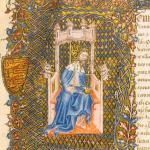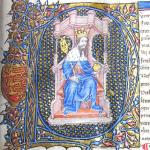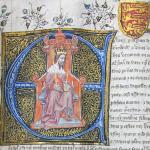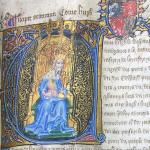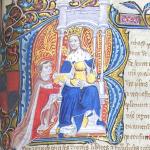STATUTA ANGLIAE
Vellum, 13.6 x 9.5, ff. 3 + 26 + 156 + 24, 39 lines to a page. Late 14th cent. (after 1388), very beautifully written and ornamented.
No donor's name appears.
Collation : 3 flyleaves (1 stuck to cover) : a12 b8 c6 | 18 - 88 94 108-208 | d6
e8 (8 stuck to cover).
On flyleaf an erasure, apparently of a French inscription : not recoverable.
Contents :
List of Statutes . . . . . . . . . f. i
(Henricius ultimus) I Magna Carta.
(Ricardus Rex illustrissimus) lxxiii. Statutum de anno duodecimo.
f. iib blank.
Capitula of Statutes . . . . . . . . iii
Inc. Capitula Magne Carte.
Ending f. xxiii a, xxiiib- xxvib blank. Some late names (xvi-xvii) on
xxvi a erased.
Text of Statutes:
Hericius ultimus. Magna Carta . . . . . 1
Edwardus primus. Articuli super cartas editi. . . 10
Edwardus secundus. Commissio ordinacionum . . 53
ff. 65b - 68 blank1.
Edwardus tercius. Statutum come hugh le despenser . 69
(Ricardus secundus.) Stat. de anno primo . . . 133
Ending with Statutum de anno duodecimo
-a Caleis le primer iour de decembre prochein a venir . 156b
The remaining leaves are ruled out blank.
The text is in Latin and French : the first in French being the Articuli
super cartas, f.10.
The ornamentation of the book is very fine. Each statute has an admirable initial usully of thick pink and blue foliage on gold ground. Besides this there is a highly ornamented page at the beginning of the Statutes of each reign. Thus :
f.1. Full border. Magnificent initial about 4.5 x 3.5 inches, mostly of gold lozenge
work. Henry III on canopied throne with sceptre and orb with tall gold cross. On L.
the shield of England ancient.
f.10. Full border and very similar initial, of Edward I. Shield of England on L.
f.53. Full border. Initial with black ground and gold flourishing, representing Edward II : shield of England above.
f.69 Full border. Initial with ground as last, representing Edward III. Shield of England and France quarterly above.
f.133. Full border. Initial : pink ground with gold flourishing. Richard II on throne, a kneeling cleric in pink furred mantle over scarlet gives him a book. Shield of England and France quarterly.
1 After the ordinacio de statu terre hibernie (c. viii). In the table of chapters a blank page is left, and chapters xx-xli of another statute are given with a note, Vacat hic.
With regard to the erasure on flyleaf: Erasure irrecoverable with ultra-violet light. It had probably been treated with a reagent.
Regarding f. xxvia, a powdering of chalk was removed in 1947 and the names [Parnell, Drue, Bugbee and Fuelin] are now legible, also a verse:
A man of wordes and not of deedes
is like a gardin full of weedes
The lower inscription of two lines not legible with ultra-violet light.
[Same inscription in B.M. Addit. MS. 32578 f. 92v. =16th century hand].
f. 1, an inscription in the bottom right hand corner partly cut away, seems to read: [? pour] [word illegible] des v g[r]a[n]d[es] l[ett]res xl.
M. Rickert, The reconstructed Carmelite Missal (London, 1952), pp. 79-80.
M. Rickert, Painting in Britain (1954) p. 158.
L. J. Sandler, Gothic Manuscripts 1285-1385 (Oxford, 1986)
Selby Whittingham, 'The Chronology of the portraits of Richard II', Burlington Magazine 113 (1971).
P.R. Robinson Catalogue of dated and datable manuscripts c.737-1600 in Cambridge libraries (Cambridge, 1988) vol. I, p. 85, no. 291; vol. II pl. 174 (fol. 133).
D. Gordon, Making & meaning: the Wilton Diptych (London, 1993), fig.3 (initial of Richard II).
Exhibited (f. 53) at the Burlington Fine Arts Club, Exhibition of Gothic Art in Europe (c. 1200 - c. 1500), 1936. Catalogue no. 83.
Exhibited (f.1r) at the Fitzwilliam Museum, Cambridge, from 26 July to 11 December 2005. See the exhibition catalogue: P. Binski and S. Panayotova (eds.), The Cambridge Illuminations: Ten Centuries of Book Production in the Medieval West (London: Harvey Miller, 2005) no. 134.
